Tonight I finished reading this amazing book. The story depicted slavery in a much more brutal way than any other story I can recall reading. As I worked my way through the book, the terms, “white privilege” (a term I have struggled to understand) and “black lives matter” have played over and over again in my mind. I also think of “black holocaust”, a term I had only recently heard, yet as I read of Cora’s experiences and observations in North Carolina, shares so many similarities to the Jewish holocaust.
I need to take a day or two to think about this book and let its story gel in my mind before I can write much more about it. I am appalled and moved beyond description for the things that occurred in this story. I think this is an important book that will stand the test of time and, and hard as it was to read, I am glad to have read it.
BOOK DISCUSSION LINKS – Please click the three links below to view my thoughts regarding the questions presented:
01 – What were your initial impressions of the book?
02 – What did you think of the characters that Cora encountered?
03 – What did you think of Cora and her situation?
Here’s some additional links about this book that you might find of interest:
- Book Review from The New York Times: “In Colson Whitehead’s Latest, the Underground Railroad Is More Than a Metaphor”
- Interview with Colson Whitehead: “To deal with this subject with the gravity it deserved was scary”
- NPR author interview: Colson Whitehead’s ‘Underground Railroad’ is a Literal Train to Freedom

Thanks Lynne, I got the book on Sunday but haven’t started reading yet. I’m looking forward to getting back into the swing of things too.
I looked around for some questions that we can consider as we read the book, and I found these from Oprah’s book club website (link is shown below). I don’t think we need to discuss each of these questions, but I’m going to keep them in mind and make notes as I read the book – I’ll post my reactions in a later comment.
Questions to consider:
1. How does the depiction of slavery in The Underground Railroad compare to other depictions in literature and film?
2. The scenes on Randall’s plantation are horrific—how did the writing affect you as a reader?
3. In North Carolina, institutions like doctor’s offices and museums that were supposed to help ‘black uplift’ were corrupt and unethical. How do Cora’s challenges in North Carolina mirror what America is still struggling with today?
4. Cora constructs elaborate daydreams about her life as a free woman and dedicates herself to reading and expanding her education. What role do you think stories play for Cora and other travelers using the underground railroad?
5. “The treasure, of course, was the underground railroad… Some might call freedom the dearest currency of all.” How does this quote shape the story for you?
6. How does Ethel’s backstory, her relationship with slavery and Cora’s use of her home affect you?
7. What are your impressions of John Valentine’s vision for the farm?
8. When speaking of Valentine’s Farm, Cora explains “Even if the adults were free of the shackles that held them fast, bondage had stolen too much time. Only the children could take full advantage of their dreaming. If the white men let them.” What makes this so impactful both in the novel and today?
9. What do you think about Terrance Randall’s fate?
10. How do you feel about Cora’s mother’s decision to run away? How does your opinion of Cora’s mother change once you’ve learned about her fate?
11. Whitehead creates emotional instability for the reader: if things are going well, you get comfortable before a sudden tragedy. What does this sense of fear do to you as you’re reading?
12. Who do you connect with most in the novel and why?
13. How does the state-by-state structure impact your reading process? Does it remind you of any other works of literature?
14. The book emphasizes how slaves were treated as property and reduced to objects. Do you feel that you now have a better understanding of what slavery was like?
15. Why do you think the author chose to portray a literal railroad? How did this aspect of magical realism impact your concept of how the real underground railroad worked?
16. Does The Underground Railroad change the way you look at the history of America, especially in the time of slavery and abolitionism?
Source: http://www.oprah.com/oprahsbookclub/the-underground-railroad-reading-group-guide
Tonight I finished reading this amazing book. The story depicted slavery in a much more brutal way than any other story I can recall reading. As I worked my way through the book, the terms, “white privilege” (a term I have struggled to understand) and “black lives matter” have played over and over again in my mind. I also think of “black holocaust”, a term I had only recently heard, yet as I read of Cora’s experiences and observations in North Carolina, shares so many similarities to the Jewish holocaust.
I need to take a day or two to think about this book and let its story gel in my mind before I can write much about it. I am appalled and moved beyond description for the things that occurred in this story. I think this is an important book that will stand the test of time and, ad hard as it was to read, I am glad to have read it.